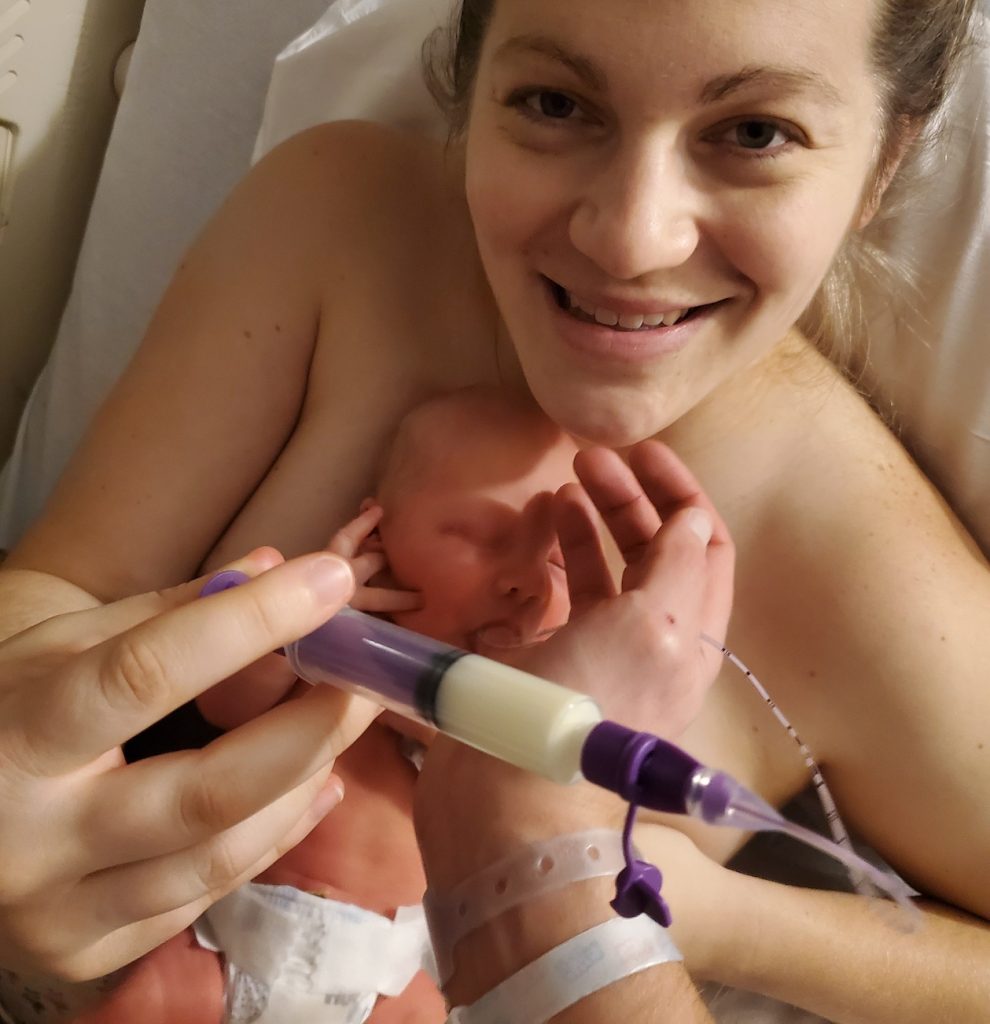Bonnie found out she was pregnant in May 2020 and had a low risk and uncomplicated pregnancy. She was expecting to go past her due date, as most first time moms do (and family history supported), but she and her husband were eagerly preparing for the arrival of their baby as the third trimester progressed. At 36 weeks, Bonnie’s water spontaneously broke (PPROM) at 8:30 pm, with contractions starting about 2 hours later on the way to the hospital. Precipitous labor ensued, and her son was born at 1:57 am.
Bonnie’s son faced a number of challenges upon being born as a late-preterm (LPT) baby. Thankfully he avoided a NICU stay, but still had a busy hospital stay full of glucose testing, a car seat fit test, jaundice, and triple feeding with a feeding schedule on top of the typical hospital monitoring and checks. Bonnie continued with triple feeding for 2 weeks, and timed feeding with supplementing as-needed until 4 weeks. At 5 weeks postpartum , Bonnie discovered that her son has cow’s milk protein intolerance (CMPI) when he started suffering from GERD reflux and a host of other symptoms. Bonnie proceeded to cut all dairy from her diet so she could continue breastfeeding, but it still took until her son was 3 months old for her son’s reflux to be under control and for the other symptoms of her son’s CMPI to be resolved. Bonnie also learned that her son had a peanut allergy at 8 months old, and even though his reactions to-date have been minor, allergy testing indicates that he is at high risk for anaphylaxis and he is unlikely to outgrow the allergy which adds another diet limitation and stressor to the family.

These challenges were especially difficult for Bonnie and her husband to handle because of a lack of local support, which was exacerbated by COVID risks and having an immunocompromised LPT baby since COVID vaccines were not widely available at this time. Because Bonnie gave birth at 36 weeks, she and her husband lost a month of planning time. This means they never had the chance to establish COVID boundaries before the baby arrived, figure out which family would be called on to help and explain to them what precautions would be expected of them, or line up professional help for support. And with the risk of COVID and other winter illness, the typical pre-COVID “just come over and help however” arrangement for her husband’s local family felt risky. Bonnie and her husband were grateful to have a meal train provide a month of food, which felt like safe and effortless help to accept. But besides a 2 week visit from Bonnie’s parents, Bonnie and her husband didn’t have any in-house help for the first few months. With the challenges piling up, they just didn’t have the energy or bandwidth to orchestrate and coordinate help and ended up stuck in survival mode. Even after her son got stronger and COVID vaccines became widely available, Bonnie and her family opened up more but still found that they were getting far less local support than expected or needed, and it is so difficult to catch up without a support system to help. Bonnie and her husband realized that they were still in survival mode while celebrating their son’s first birthday, which prompted the decision to make a change and move to be closer to Bonnie’s family (currently in progress).
Bonnie’s birth and postpartum experience was traumatic, but she was so preoccupied dealing with one challenge after another that she didn’t realize this until months later. Even after this realization, Bonnie had had a hard time finding time to prioritize herself and her need to work through the trauma. At 15 months postpartum, she still feels that this is still a work in progress, and credits listening to other Birth Hour podcast episodes and joining the KYO zoom calls as two of the big pieces of her healing process. She hopes sharing her story will help others either avoid some of the challenges she faced, or at least feel better prepared to face them.

Bonnie Anderson Bio
Bonnie is a 32 year old who has been married for 3 years to her husband, Blake, and is a mom to 15 month old Franklin. She works as a geotechnical engineer. She absolutely loves being a mom to Franklin and watching him learn about the world with endless curiosity and a contagious sense of humor. Bonnie and Blake met, married, and started raising Franklin in Minnesota, but are in the midst of a move to southeast Pennsylvania to be closer to Bonnie’s family.
Resources
- The Birth Hour podcast
- KYO class and zoom calls
- “Dairy Free Diet – Breastfeeding” Facebook group
- FARE (Food Allergy Research + Education)
- What About Us? (book by Karen Kleimen)
- Seraphine Sub-Zero 3 in 1 Maternity Parka (for pregnancy and babywearing)
Ergobaby
Today’s episode is sponsored by Ergobaby. Founded in 2003, Ergobaby has pioneered the gold standard for comfortable, ergonomic soft structured carriers. Their commitment to providing parents with the foundation to thrive has launched the company into creating a broad range of award-winning products that fit into families’ daily lives seamlessly, comfortably, and safely – where function and quality are not compromised. In 2020, they launched Everlove by Ergobaby, a first of its kind baby carrier buy back and resale program, a sustainability effort to support families and the planet. Check out Ergobaby’s Embrace in Soft Air Mesh that we discussed on the podcast!

No Comments yet!